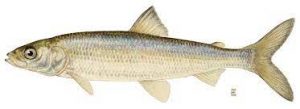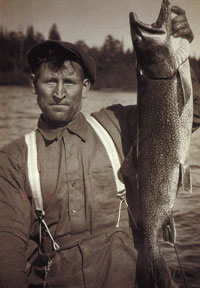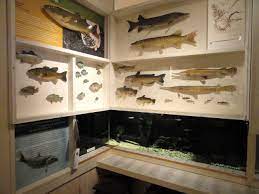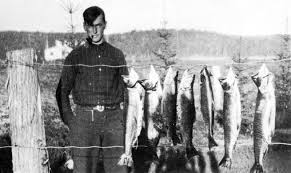BIG FISH FROM ALGONQUIN PARK by Ralph Bice
From July 5, 1978

When people talk of large fish they usually think of quite large lakes where there is so much food and fish have a good chance to grow to a good size. So, when one thinks of Algonquin Park where only a few of the many lakes are what might be called large, it is understandable that fish will not become as big as they would in waters where there is more abundant food. A great many of the lakes are of the glacial type, spring water, and not so large or deep. The fish, mostly trout, feed mostly on plankton and this type as a rule does not get too large. Again, on the larger lakes where there are many of the tullibee type (Cisco, Lake herring – Ed.) of small fish, these are eaten by lake trout and helps them to grow larger.

Opeongo Lake has always been known as a lake that produces larger than average lake trout. Same could be said of Cedar, Lamuir, Big Trout, Catfish and Merchants. The largest lake trout I ever helped catch was in Little Trout, the first lake east of what was then Eagle, now called Butt. This fish, in the museum at Huntsville, weighed in at a little over 28 pounds.
Many years ago it was quite common to catch a laker of the 25-30 pound class in Moose Lake, now called McCraney. In 1926 there was a fish taken there that weighed, on the scales at the R.R. station, 42 pounds. I do not think that was ever recorded. About that same time Charlie Skuce, guiding from Northway Lodge, caught a lunker in Merchants Lake, took it out and it was mounted, that weighed 34 pounds. That may be the largest laker on the records, if anyone bothered to record fish away back then.
The largest lake trout I know of was taken in what is now called Happy Isle Lake. This fish was caught in a net set by the late Henry Dennison, who then had a farm on Opeongo well before the park was established. Just why he would leave Opeongo where there was the choicest fishing and go then to what was called Johnston Lake he did not explain. But he told me this when I met him in the woods in 1918. He had known my grandfather and we had a good talk about the days away back. There was a timber camp there then. At any rate, he had set a net and caught among others this large lake trout that weighed 52 pounds.

I have caught many fish in that lake which later was Green Lake but now Happy Isle. But very few over two pounds. Awfully good eating but all small. Other lakes that produced good sized fish would be Smoke, Lavielle and Lake Clear (Dixon).
And bass. Most of the bass are from fish that were planted shortly after the park was established. Some did work in from the east side but most Algonquin Bass are originally from other areas. A bass caught in Macauley Lake was on display at the Sportmen’s Show and it was a nine pounder. The only bass I know of that won a first in the Star contest and taken in the Park was caught in Jubilee Lake. This fish, also in the Huntsville Museum, weighed seven pounds, ten ounces. Then away back just after the first world war there was a bass caught by some boys at Whitney who saw it in a secluded pool and could not catch it as it broke their lines. So they obtained a larger hook, some light rope and tied one end to a stump, tossed the bait, a quite large frog, into the pool and just waited. The bass took the frog and it took the combined effort of three of them to pull the fish out. They cleaned it, left it on ice for a day, then sold it to the storekeeper who put the cleaned fish on the scales, no head, no guts, and paid them for eight pounds of meat.
Not so many years ago a bass was caught on Rainy Lake in the spring by a man fishing shallow for trout that weighed more than nine pounds.
The largest speckled trout was also taken in a net. Not exactly in the Park but not many yards away. On beam scales it weighed over 20 pounds. I talked to one of the men who took it. This might have been an all time record. The largest speckled trout any of our parties have caught was six and one half pounds. Have many at six and over five. This some years ago as they do not seem to have the chance now to grow large. The late Dan Stringer, Park Ranger, told me of a speckled trout he caught at the upper end of Longer Lake and on a fish scale someone had weighed over eight pounds. We used to send in scales from large speckled trout and we only had one that was six years old. Mostly just five years of age. One, a 26 inch speckled trout, proved to be five years old.
There is only one lake I know that has pickerel, or walleyes. That is Lake Travers. Never saw a very large one. Also that is the only lake with Muskies. In 1923 Billy Teniscoe was guiding a party there and he told me of this huge fish that as usual got away. He said it would go well over 40 pounds. I gave it little thought. I was going with a large party there. When there the Ranger, Jack Culhane, told us of a dead muskie on the beach. It had an archer spinner in its throat and no doubt was the fish Billy Teniscoe told me about. I have wondered why we did not skin it and bring it out as it was reasonably fresh. I do not remember the measurements but I have seen plenty of other muskies and do not think there is any doubt this fish would weigh over 50 pounds. In all the fishing that was done in that lake during those years I never heard of one anywhere near that size.

